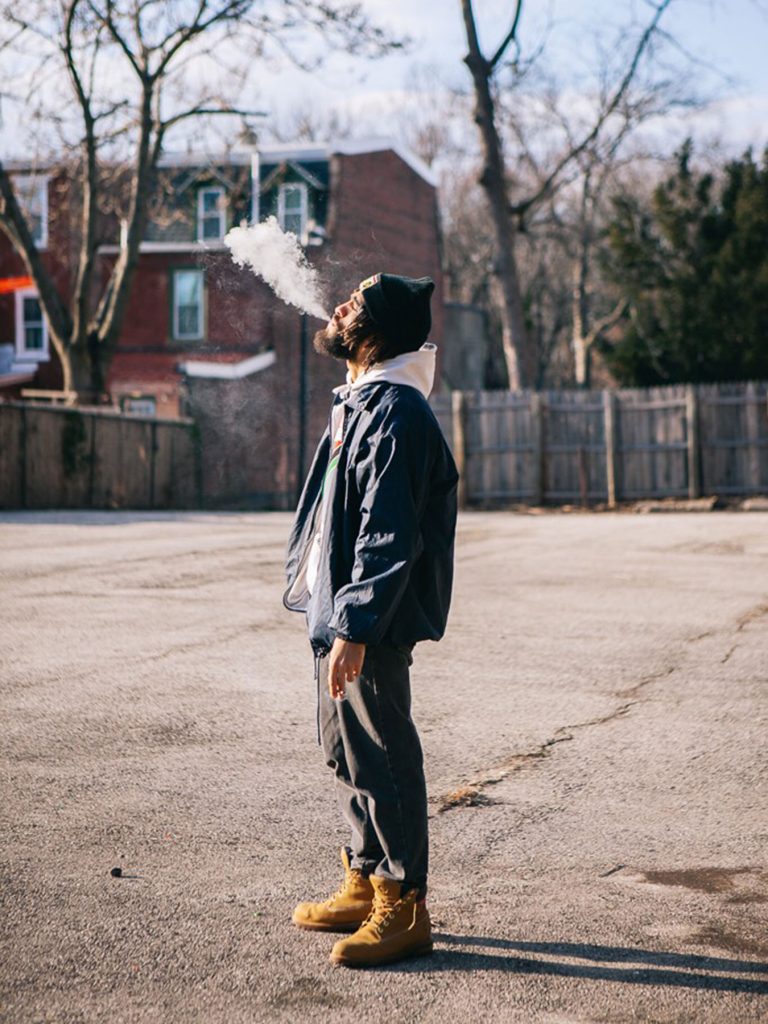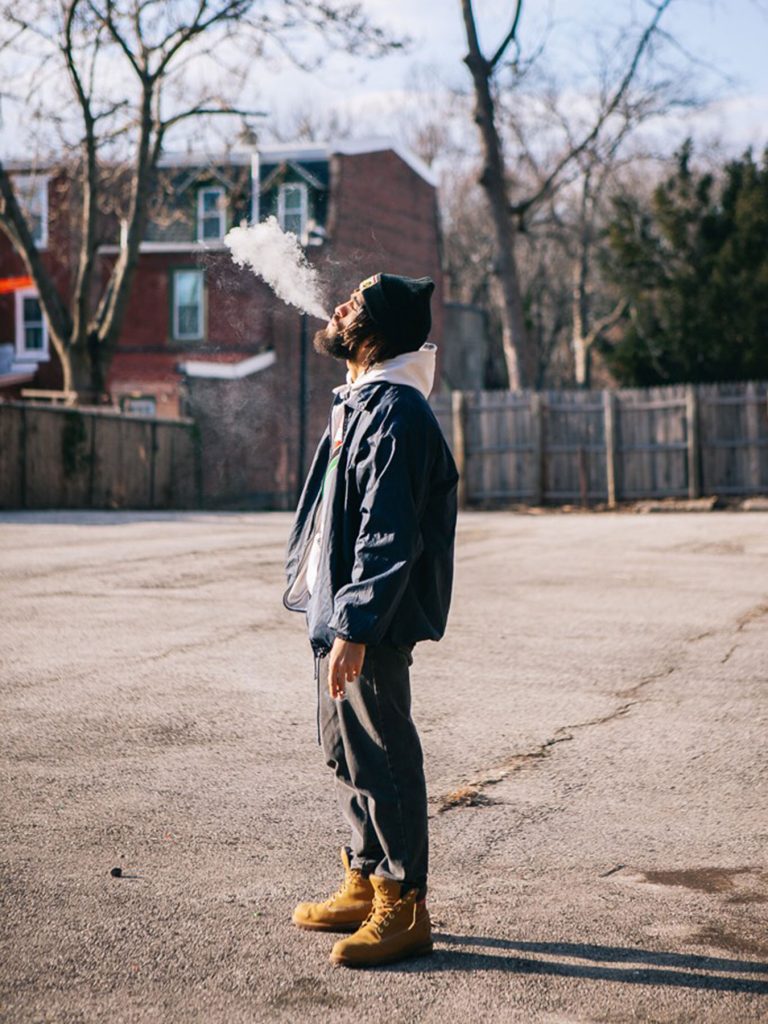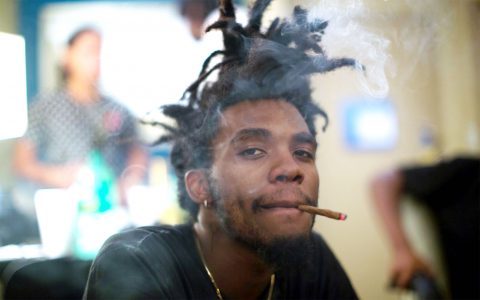Living life as an artist in a capitalist nation is no easy task. A society that perpetuates the idea of hard work equating to more money is simply not effective for the modern artist who aims to pursue a career in their craft: A person starting out with zero finances, the will and vulnerability to monetize their outlet, and the ability to forfeit money from necessities in order to fund more artistic endeavors.
Find cannabis near you. Check menus close by with Leafly Finder.
Philly rapper lojii is acutely aware of these realities, and waxed poetic on the subjects of money and expression with his first full-length album, Due Rent, which dropped last year on Fresh Selects. Produced entirely by beatmaker Swarvy, who linked up with the rapper via Twitter DM, lojii shed light on the experience of a struggling hustler who is just trying to get by without drowning in money woes.
The Cost of Creative Production
 (Courtesy of Lojii)
(Courtesy of Lojii)
The 22-track double album was a project birthed from anxiety and doubt yet written by a dreamer schemer who envisioned an expansive world for himself. But America continually inhibits his pursuit of happiness. Grimy lyrics spit lazily, but sometimes urgently over jazzy, often dark production that cycle between familiar sample loops and interesting compositions by Swarvy.
No moment feels wasted, no instrumental or vocal overstays.
Due Rent offers a batch of songs that are short and tight-knit, with the majority standing at under two minutes. No moment feels wasted, no instrumental or vocal overstays.
“We decided to do an album when lojii was short on rent one month,” Swarvy told Pigeons & Planes last year. “I lent him the dough and said we’ll make it back doing an album.” lojii, hesitant when it came to pursuing the project, revealed to Green Room, “I was sleeping on myself. Like, I need rent in a week and a half, we ain’t got time to make a tape.”
But make a tape they did, and Due Rent released to critical acclaim, becoming an underground breakthrough in 2017. Miniature vignettes of lojii’s mindset that encapsulate both doubt and hopes for a better future weave through the album; journal entries from a young black man fed-up with all problems pointing back to money.
On “poor git da $$$,” lojii raps about his frustration with sleeping on the floor next to roaches, and imagines himself taking over the music world by way of words. Swarvy lays out an instrumental switch-up that recalls J Dilla’s “Workinonit,” with a sample flip of 10cc’s “The Worst Band In the World.”
“ouchea…” details lojii’s anxiety with pursuing more capital, while trying to focus on being mindful of his life. “I can’t find my mind, must’ve lost it outchea looking for all these dollar signs,” lojii earnestly raps.
Ultimately, the project’s inception and execution could be tied with four simple bars on the album’s opener and titular track:
Landlord asking for the check, I ain’t make a check
Said, “You still ain’t make a check? You ain’t makin’ bets”
Well, I still ain’t make a check but I’m takin’ bets
Put some money down, watch me make the rest
Rent was paid, Due Rent was made, and residuals ensued. The album’s Bandcamp release would springboard into the limelight, eventually selling out of both physical vinyl and cassette release.
Finding Release in Philadelphia
“My pops played in a band. That’s not what he does with his life no more, but he was a musician.” lojii told me over the phone. “Him, uncles, close friends … He was playing psych rock and jazz, funk. He don’t fuck with rap like that, though.”
And although that was the case, lojii’s introduction to hip-hop came via crossover appeal with his father. “When it came to rap, he was fucking with the things that made sense for him to fuck with, like A Tribe Called Quest and Digable Planets. I mean, g-funk had funk in it and he liked some of the music in g-funk, but he wasn’t really up on that gangsta shit. [Laughs]. But he put me onto music. Pops used to play Digable Planets, that “Cool Like That” shit. That made me wanna rap. I thought they was so slick, the way they was talking over they music, over the horns and shit.”
Over the phone, lojii seemed naturally cool and reserved, though it could’ve been a combination of the weed smoke he was exhaling during our interview, and perhaps a need to control a sense of privacy.
When asked about being born and raised in Philly, he was quick to correct: “I was born in Jersey, but I was raised on the north east coast. My pops lived in Philly. He lived in Philly before my parents even got together. They got together and tried to do the family thing. When the split happened, I was with ma, so I was kinda moving around with her,” lojii explained. “Philly was the city that was the only constant. Pops never moved, so Philly was always the one constant place.”
lojii bounced around from place to place, with no means of transport … while crafting music and smoking weed.
Philly is also where lojii remains, for the time being. He couch-surfed in New York for six months before doing the same in LA for roughly a year before moving back to Philly. The recorded thoughts on money and the pressure of keeping up with job applications revealed on Due Rent were obviously genuine. lojii bounced around from place to place, with no means of transport (he reportedly told he skated and took the train or bus everywhere while in LA), while crafting music and smoking weed.
“I do a lot when I smoke,” he tells Leafly. “I’m doing this interview. [Laughs] I do it all. I write and smoke, record and smoke. I do both sober all the time, no difference. It just cycles in and out seamlessly. I keep it real classic—Blue Dream, all the time. Some people get into the extra shit, and I’ve tried a lot of shit too. I like OG, but some of that stuff is too strong though, like GSC. That shit makes me feel like I’m on pills sometimes,” he jokes.
Find Blue Dream Nearby
The rejection and ironic acceptance of money was showcased once again this year, with his sophomore album, lofeye. Unlike Due Rent, lofeye was a collection of raps lojii had crafted throughout the years, but had never released prior, with some songs dating back to 2013. The album name is a play on lo-fi hip-hop, which lojii finds himself closely associated with due to some fans labeling his music as an internet aesthetic.
“I think it’s hilarious,” lojii says on being labeled lo-fi. “I mean, shit. The people who coined that term, like lo-fi, fuzz, and noise rock people who coined that term, they been said that shit was dead. That shit was dead to them a long time ago. I don’t know… Like, the [TB-303] kinda shit and old hardware, dusty records—hip-hop is already very lo-fi in essence. Anything can be lo-fi, you know? You just dumb down the quality.”
“I get lumped in with it,” he continued, “but I can understand how my shit comes across as lo-fi.” While Due Rent stands as a cohesive project and concept, lofeye shows lojii toying with multiple styles and ideas.
On “lo in the jungle,” produced by thook, lojii rides along to a sort of stripped back, dark safari-tinged instrumental, rapping on the black plight in America, and taking shots at rappers who shout out racist white clothing designers who do not stand with black lives, but choose instead to use black music as a platform for promotion. On “reignfall,” lojii displays a more aggressive delivery:
Blood on the wall, I made a painting,
blood on the wall, made you a painting
When lofeye debuted, lojii dropped took to Twitter to elaborate its release with a frank statement: “this LP thats dropping isn’t a reflection of where i’m at now it’s a compilation of where i been.” After that, he went silent on his social media accounts to focus on life. “It was more like, here’s the old me. It was release, I just needed to let that stuff go.”
lojii
The conversation drifted into talking about rap contemporary Earl Sweatshirt, and the balance of rapper life and real life. Earl Sweatshirt has been relatively quiet since his 2015 album, I Don’t Like Shit, I Don’t Go Outside. His mental issues caused him to cancel shows in the past, and at the rate in which music releases so frequently, the demand for new music has weighed heavily with each passing day.
lojii can relate. “There’s still certain artists where I’m like, ‘I don’t care how long it takes.’ D’angelo took 14 years [to drop Black Messiah]! It’s like what Earl was dealing at times. People don’t give a fuck, they just demand shit. He could post a picture with him with a puppy just chillin and people will just harass him, asking when he’s gonna give them an album. People don’t understand, we’re giving you our full lifeforce. I gave people two full length albums in two years, that’s a lot of music, for real for real. I’m chillin right now, I’m living my life. I’m in the hyperbolic time chamber.”
“But the shit I’m making now is like, that’s what I’m on,” lojii assures. “That’s what my real shit is going to be. My debut solo shit. I’ve always been working on shit.”




